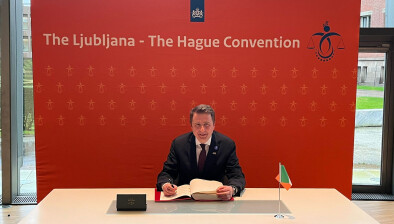Court of Appeal: Man fails in appeal against his extradition to USA to stand trial for ransomware conspiracy charges

The Court of Appeal has dismissed the appeal of Oleksi Oleksiyovych Lytvynenko against his extradition to the USA to stand trial for ransomware conspiracy charges.

About this case:
- Citation:[2025] IECA 212
- Judgment:
- Court:Court of Appeal
- Judge:Ms Justice Tara Burns
Delivering judgment for the Court of Appeal, Ms Justice Tara Burns was satisfied inter alia that the fact that the appellant had acquired temporary protection in Ireland could not act as an automatic bar to his extradition to the USA and that if subjected to deportation from the USA, he could avail of a procedure in which he could make representation as to why he should not be deported to a specific country.
Background
On 8 June 2023 the USA sought the extradition of the appellant, a Ukrainian national lawyer, to facilitate his trial in the USA on conspiracy charges arising from his alleged deployment of malicious ‘ransomware’ against a government entity and two businesses in Tennessee, resulting in the payment of a combined ransom of approximately $634,000 in cryptocurrency.
The appellant had been given temporary protection in Ireland under the International Protection Act 2015 (as amended) in light of the Russian invasion of Ukraine.
Upon the application of the respondent to the High Court, Mr Justice David Keane made an order pursuant s.29 of the Extradition Act 1965 (as amended) for the extradition of the appellant to the USA.
On appeal, the appellant alleged inter alia that the High Court’s decision breached his right to a fair trial under the European Convention on Human Rights (ECHR) and the Constitution, breached his “family life” rights under Article 8 ECHR and Article 41 of the Constitution where his extradition would be incompatible with the State’s obligations under EU law to offer temporary protection and reunification rights to those fleeing war in Ukraine, and alleged that there was no equivalent protection to temporary protection in the USA and if extradited, he would lose the right to temporary protection and would be deported to Ukraine following the conclusion of his criminal proceedings.
The Court of Appeal
As to the appellant’s “fair trial” rights, the court considered his assertion that he was unable to obtain evidence in aid of his defence from either Ukraine or from his electronic devices which had been seized by gardaí, that the unavailability of such evidence was detrimental to his ability to resist his extradition and that if extradited, this would negatively impact his defence against criminal proceedings in the USA.
Having considered the relevant case law, Ms Justice Burns pointed out that the appellant had failed to identify what evidence was lost to him because of the war in Ukraine and what evidence was on his own devices, and further, how any such evidence would assist his objection to his extradition and why he believed that he would not be provided with proper disclosure by the US authorities of relevant material contained on his personal devices.
Having regard to Minister for Justice v Stapleton [2008] 1 IR 669, the court was satisfied that the appropriate venue for the litigation of any issue in relation to missing evidence or lack of disclosure are the courts of the requesting state and accordingly, found that the trial judge made no error in that regard.
Turning to the grounds of appeal concerning the appellant’s “family life” rights, the court considered the appellant’s contentions that inter alia his family would be unable to avail of temporary protection in the USA as it was not a recognised legal status there, would be subjected to revictimisation and trauma by his extradition, and would not be able to visit him if they were to have difficulty obtaining American visas.
Ms Justice Burns opined:
“Undoubtedly, there will be an interference with the family life of this family, and it is the case that their position is unusual in light of the fact that they have fled war torn Ukraine, with the personal trauma that would have ensued. However, extraditing the appellant to the USA, having regard to these circumstances, does not amount to an interference with family life such that it can be categorised at the level of exceptionality that extradition should not occur.”
The judge continued: “While his family may be unable to reside in the USA on a permanent basis, as the legal status of temporary protection would not be available to them, that is no different to any other family where a family member is extradited. With respect to obtaining visas to visit the USA, I cannot imagine that they are in a different position to any other applicant for a visa and certainly no contrary evidence was placed before the High Court in that regard.”
As to the appellant’s assertion that following the conclusion of his trial in the USA, there was a real risk of his deportation to Ukraine contrary to the principle against refoulement, Ms Justice Burns was satisfied that the trial judge had received information from the requesting State to the effect that it would be open to the appellant to make a claim for relief from removal based upon a credible fear of return based on a protected ground or a fear of torture.
Having regard to Minister for Justice v MEH [2022] IEHC 71, Ms Justice Burns was satisfied that the fact that the appellant had acquired temporary protection in Ireland did not act as a bar to his extradition and that in light of the response received from the USA, the trial judge did not err in his determination that the appellant was not at risk of refoulement once released from custody.
Conclusion
Accordingly, the Court of Appeal dismissed the appeal.
The Attorney General v Oleksii Oleksiyovych Lytvynenko [2025] IECA 212










